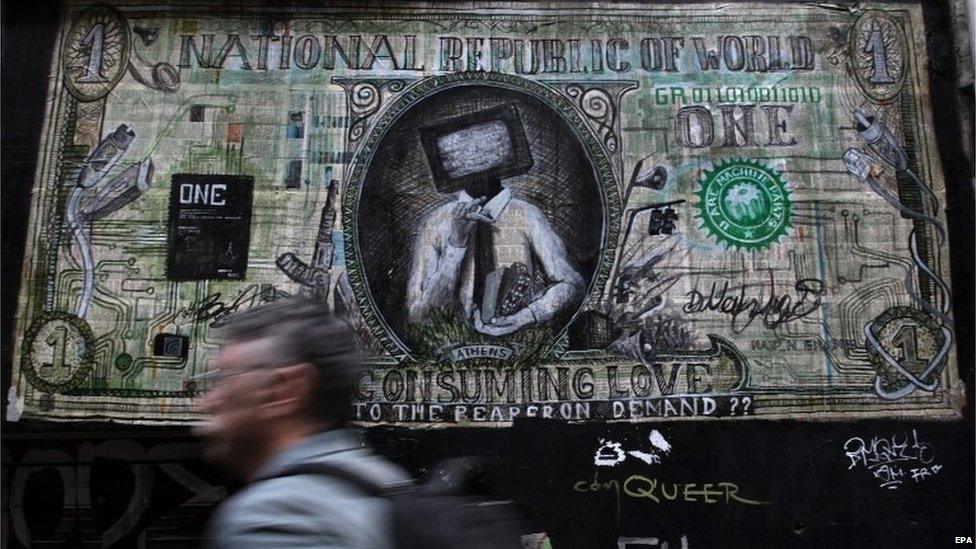Peston: ECB to turn off emergency Greek help
- Published
- comments

Greek banks could be in serious straits by Monday
The European Central Bank's governing council is expected to turn off Emergency Liquidity Assistance (ELA) for Greek banks at its meeting later today, according to well-placed sources.
So unless Greek savers miraculously decide to cease withdrawing cash from their accounts, Greek banks would find themselves in serious straits as soon as Monday - because the banks have become dependent on ELA, approved by the ECB but supplied by the Bank of Greece, to provide the cash to depositors who want their money back.
"We think the Greek government will have no choice but to announce a bank holiday on Monday, pending the introduction of capital controls," said a source.
Capital controls are restrictions on how much customers can withdraw from banks. Until now, the Greek government has been signalling that it does not want to introduce this restriction on the way banks can operate.
The expected decision by the ECB to terminate emergency lending to Greek banks stems from yesterday's decision by the eurogroup of finance ministers that there is no way now of preventing Greece tumbling out of the current bailout programme on Tuesday and also of defaulting on a €1.5bn (£1.1bn) due payment to the IMF on the same day.
Painful episode
So, with Greece no longer participating in a formal rescue programme, it is seen as impossible for the European Central Bank to continue extending credit to Greek banks - because the solvency of the Greek state would be in doubt, and the solvency of banks is so intimately linked to the solvency of the state.
The prospect of banks being forced to close tomorrow, or, if they're not, of a devastating run on them, represents the most painful episode in Greece's financial and economic crisis, since it blew up in 2009.
It is also the greatest perceived threat to the integrity of the eurozone since it was created in 1999.
If the Greek government refuses to shut the banks, the European Central Bank - as regulator of eurozone banks - could recommend that all branches of Greek banks outside Greece be closed to preserve cash.
But since Greek banks could get their hands on cash in branches outside the Greek mainland, closing overseas branches but not Greek branches would be seen as favouring Greek residents over customers in the rest of the world.
UPDATE - 13:50
So the European Central Bank has made its historic decision not to increase Emergency Liquidity Assistance to Greek banks.
You can read the statement here. , external
It means Greek banks run the horrendous risk of running out of cash, if they open for business as normal tomorrow.
The Governor, Yannis Stournaras, of the Bank of Greece said: "The Bank of Greece, as a member of the Eurosystem, will take all measures necessary to ensure financial stability for Greek citizens in these difficult circumstances."
The presumption in central banks and regulatory authorities around the EU is that this means there will be an exceptional bank holiday tomorrow - pending the imposition of limits on withdrawals from accounts (or capital controls).
Goodness only knows what mayhem will ensue if banks open as normal.
There are some who believe the Syriza government won't impose capital controls, and would then endeavour to lay the blame for the ensuing financial carnage at the door of the ECB, one of the government's major creditors.
But the economic price for this kind of political point-scoring would be massive, to put it mildly.